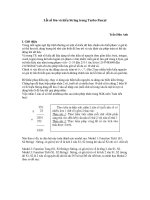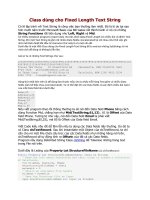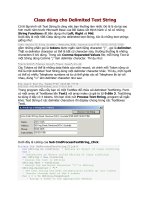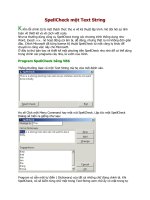String Manipulation
Bạn đang xem bản rút gọn của tài liệu. Xem và tải ngay bản đầy đủ của tài liệu tại đây (394.34 KB, 11 trang )
111
14. String Manipulation
As has been mentioned earlier in the guide, a string in C is a sequence of bytes in memory,
terminated by a NUL character ('\0'). The NUL at the end is important, since it lets all these string
functions (and printf() and puts() and everything else that deals with a string) know where the
end of the string actually is.
Fortunately, when you operate on a string using one of these many functions available to you,
they add the NUL terminator on for you, so you actually rarely have to keep track of it yourself.
(Sometimes you do, especially if you're building a string from scratch a character at a time or
something.)
In this section you'll find functions for pulling substrings out of strings, concatenating strings
together, getting the length of a string, and so forth and so on.
Beej's Guide to C Programming 112
14.1. strlen()
Returns the length of a string.
Prototypes
#include <string.h>
size_t strlen(const char *s);
Description
This function returns the length of the passed null-terminated string (not counting the NUL
character at the end). It does this by walking down the string and counting the bytes until the NUL
character, so it's a little time consuming. If you have to get the length of the same string repeatedly,
save it off in a variable somewhere.
Return Value
Returns the number of characters in the string.
Example
char *s = "Hello, world!"; // 13 characters
// prints "The string is 13 characters long.":
printf("The string is %d characters long.\n", strlen(s));
See Also
Beej's Guide to C Programming 113
14.2. strcmp(), strncmp()
Compare two strings and return a difference.
Prototypes
#include <string.h>
int strcmp(const char *s1, const char *s2);
int strncmp(const char *s1, const char *s2, size_t n);
Description
Both these functions compare two strings. strcmp() compares the entire string down to the
end, while strncmp() only compares the first n characters of the strings.
It's a little funky what they return. Basically it's a difference of the strings, so if the strings
are the same, it'll return zero (since the difference is zero). It'll return non-zero if the strings differ;
basically it will find the first mismatched character and return less-than zero if that character in s1
is less than the corresponding character in s2. It'll return greater-than zero if that character in s1 is
greater than that in s2.
For the most part, people just check to see if the return value is zero or not, because, more
often than not, people are only curious if strings are the same.
These functions can be used as comparison functions for qsort() if you have an array of
char*s you want to sort.
Return Value
Returns zero if the strings are the same, less-than zero if the first different character in s1 is
less than that in s2, or greater-than zero if the first difference character in s1 is greater than than in
s2.
Example
char *s1 = "Muffin";
char *s2 = "Muffin Sandwich";
char *s3 = "Muffin";
strcmp("Biscuits", "Kittens"); // returns < 0 since 'B' < 'K'
strcmp("Kittens", "Biscuits"); // returns > 0 since 'K' > 'B'
if (strcmp(s1, s2) == 0)
printf("This won't get printed because the strings differ");
if (strcmp(s1, s3) == 0)
printf("This will print because s1 and s3 are the same");
// this is a little weird...but if the strings are the same, it'll
// return zero, which can also be thought of as "false". Not-false
// is "true", so (!strcmp()) will be true if the strings are the
// same. yes, it's odd, but you see this all the time in the wild
// so you might as well get used to it:
if (!strcmp(s1, s3))
printf("The strings are the same!")
if (!strncmp(s1, s2, 6))
Beej's Guide to C Programming 114
printf("The first 6 characters of s1 and s2 are the same");
See Also
memcmp(), qsort()
Beej's Guide to C Programming 115
14.3. strcat(), strncat()
Concatenate two strings into a single string.
Prototypes
#include <string.h>
int strcat(const char *dest, const char *src);
int strncat(const char *dest, const char *src, size_t n);
Description
“Concatenate”, for those not in the know, means to “stick together”. These functions take two
strings, and stick them together, storing the result in the first string.
These functions don't take the size of the first string into account when it does the
concatenation. What this means in practical terms is that you can try to stick a 2 megabyte string
into a 10 byte space. This will lead to unintended consequences, unless you intended to lead to
unintended consequences, in which case it will lead to intended unintended consequences.
Technical banter aside, your boss and/or professor will be irate.
If you want to make sure you don't overrun the first string, be sure to check the lengths of the
strings first and use some highly technical subtraction to make sure things fit.
You can actually only concatenate the first n characters of the second string by using
strncat() and specifying the maximum number of characters to copy.
Return Value
Both functions return a pointer to the destination string, like most of the string-oriented
functions.
Example
char dest[20] = "Hello";
char *src = ", World!";
char numbers[] = "12345678";
printf("dest before strcat: \"%s\"\n", dest); // "Hello"
strcat(dest, src);
printf("dest after strcat: \"%s\"\n", dest); // "Hello, world!"
strncat(dest, numbers, 3); // strcat first 3 chars of numbers
printf("dest after strncat: \"%s\"\n", dest); // "Hello, world!123"
Notice I mixed and matched pointer and array notation there with src and numbers; this is
just fine with string functions.
See Also
strlen()









